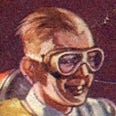“Ye gods, I can see my father now, tromping up and down the living room, waving the paper at me and raving:
“‘What’s the matter with you? Huh? Answer me that! What’s the matter with you, knocking down a poor old geezer’s only home and shelter from the elements! Just what is the matter with you?’
“And he’d never let me go on the boat trip—”
The door flew open, and a skinny old man in boxer shorts, a sleeveless undershirt, and a blue cap stood outlined by the feeble light.
“Who the hell is out there?” he demanded.
“It’s me, Cap’n,” said Raskol.
“Oh, hello there, boy. Who’s this lunatic you have with you?” He looked me up and down. I seemed to worry him. I think he thought I might fly out of control and begin breaking things. “Where are those little girls?”
“The Glynn twins?” Raskol asked. “I’m sorry, I forgot to tell them that I was coming to see you.” The captain’s face fell. “But I’ve got some clams for you, and Peter and I want to talk to you about the trip.”
Cap’n Leech brightened at this. “I’ve got your boat all built,” he cried. He cackled with pleasure and waved at us impatiently, urging us into the shack. “Come on, come on,” he said.
Inside, the place looked worse than it did from the outside. If I had kept my room the way Cap’n Leech kept his hovel, my mother would have thrown me out of the house. For furniture, he had a few burlap sacks stuffed with what I guessed was shredded paper. These served as chairs and beds. He had some packing crates here and there. One was an end table, another a coffee table. Two made a kitchen counter, on which he had a tiny gasoline-fired burner, a small version of the one that Gumma and Guppa used when they went camping.
“Now,” the captain said, taking the clams and tossing them aside impatiently, “let’s talk about the kind of boat you need. It’s got to hold two boys your size—”
“—and their gear,” I said.
The captain and Raskol gave me looks.
“You know, food, tent, first-aid kit—”
“Yeah,” snapped the captain. “It’s got to hold two boys your size and their gear. It’s got to be narrow enough to squeeze between the banks in the upper reaches of the Bolotomy—”
“That’s right,” I said. “That’s why I was thinking that a canoe—”
They were giving me looks again. I shrugged and kept quiet.
“It must draw very little water,” the captain went on, in a much louder voice. “It must be light enough for two boys your size to carry around or over obstacles.”
Raskol and I waited for him to say something else, but for a while he did nothing but giggle and rub his hands together. I wouldn’t have been surprised if he had vanished in a puff of smoke, leaving behind the dying echo of his giggle. Finally, he shouted, “I’ve got just the thing!”
He spun around and began throwing junk out of a low pine box, about eight feet long, two feet wide, and two feet deep. It was a rich mix of junk, but because socks, underwear, and torn shirts made up the majority of it, I decided that this box must be his dresser. The top of the box was propped behind it. Stenciled in a corner of the top was
IMPRACTICAL CRAFTSMAN
SHELTER KIT 6403
and
Merry Christmas Dad Your Son Raoul
was written across the top in red crayon.
“I’ve been saving this box to use as a coffin,” said the captain, “but there’s no reason why you boys can’t use it in the meantime. Grab hold, and we’ll bring her out into the light.”
Raskol and I grabbed the box by the ends and lifted. He got his end up, but his face began turning red. I couldn’t lift mine.
“Heave!” shouted the captain. Raskol let his end fall to the floor with a crash.
“It’s too heavy, Cap’n,” said Raskol.
Cap’n Leech rubbed the gray stubble on his chin for a bit, and then he climbed into the box and stretched out on his back. “I’m pretty thin,” he said. “This is a lot deeper box than I need. I’d say she’s a little less than two foot deep. Now suppose you cut off about a foot from the top part of the box. That’d leave me about nine inches depth, which should be plenty, because I don’t eat as much as I used to, and by the time I need the box I’m likely to be thin enough to just flatten right out in it.”
Raskol and the captain snapped a line around the box, and we took turns sawing off the upper foot or so. The captain made a watery chowder from the clams, an onion, and a couple of potatoes, and we ate this from cups while we worked. When we finished, we had a long shallow box that Raskol and I could carry, some spare lumber from which the captain promised to carve a pair of paddles, and lots of sawdust, which I swept through the cracks in the floor.
[to be continued on Tuesday, July 20, 2021]
You can listen to this episode on the Personal History podcast.
Have you missed an episode or two or several?
You can catch up by visiting the archive.
At Apple Books you can download free eBooks of “My Mother Takes a Tumble” and “Do Clams Bite?” the first two novellas in Little Follies.




